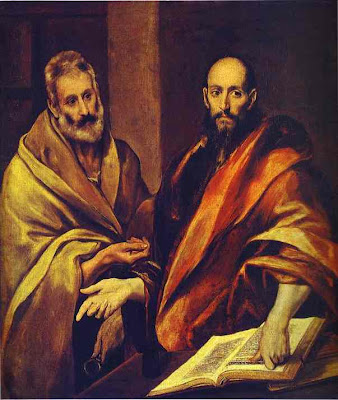
Saints Peter and Paul by El Greco
This weekend the Solemnity of Saints Peter and Paul trumps the 13th Sunday in Ordinary Time because the Solemnity is of a greater rank on the liturgical calendar.
The lectionary offers one set of scriptures for the Vigil (Saturday evening) Mass and another for the Day of the Solemnity. Some pastors might use one or the other set of readings for the whole weekend rather than prepare two homilies. Both sets of readings and background material can be found in the usual place, courtesy of St. Louis University.
Got kids? The Sadlier site offers help to prepare children for this weekend's Mass but comments only on the texts given for the Day.
My suggestion is that you take a look at both sets of texts because the combination of the two gives a fuller picture of the ministry of these two giants in the history of Christianity.






Historical Cultural Context
ReplyDeleteJohn J. Pilch
Jesus’ question, therefore, is not a “theology quiz” for his disciples. It reflects a normal, Mediterranean curiosity by Jesus, a dyadic personality, about what other people think. Like everyone else in this culture, Jesus needs such feedback because he does not know who he is, and he is trying to learn this from significant others in his life.
Jesus does not know who he is??? This is troubling to me when I have a hard enough time
having faith that as Jesus as both God and Man. Any comments?
John Pilch's mission is always to help us understand the 1st century Mediterranean culture in which Jesus lived and in which the scriptures were preached and written. Such cultural context is always helpful in deepening our understanding of the texts.
ReplyDeleteAs important as the cultural context is for understanding the scriptures, it is not the only thing. Certainly we believe that there is a truth in the scriptures that transcends cultural diversity and change.
Perhaps what you've bumped into here, Steve, is the difficulty we all have in understanding the mystery of who Christ is - that he is "true God and true man" and that his divinity does not eclipse his humanity.
Taking a look at one end of the spectrum, we might ask, "Do we believe that the infant Jesus, in Mary's arms in the stable at Bethlehem, knew and understood the physics of space flight because he was true God?" If he was truly man, then he cold not have been consciously aware of such knowledge as an infant. What was Jesus doing for the first 30 years of his life? The scripture tells us: "Jesus advanced in wisdom and age and favor before God and man." Jesus "advanced in wisdom"? Yes. Somehow in the mystery of Christ's humanity and divinity there is room for growth - not only in the sight of others but before God as well.
Pilch, then, is providing the cultural context that gives us more an understanding of the writer's mindset and what these exchanges (between Jesus and others) meant in the first century,than a psychological assessment of Jesus.
That Jesus often went into the desert or across the lake or up the mountain to PRAY, and that he struggled in prayer (in the garden of Gethsemane) tells us that he was growing in understanding and grasping and accepting what his Father was asking of him.
As Pilch writes, this is not a theology quiz. Nor is it a therapy session! It's the authors of scripture grappling with the same mystery that confronts us: Jesus is true God and true man.
Hope that helps!